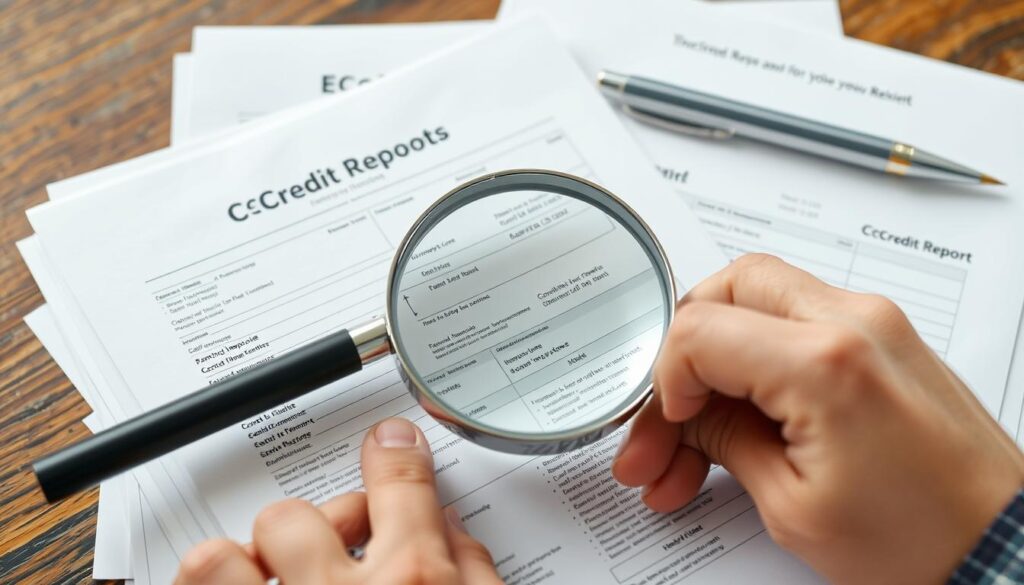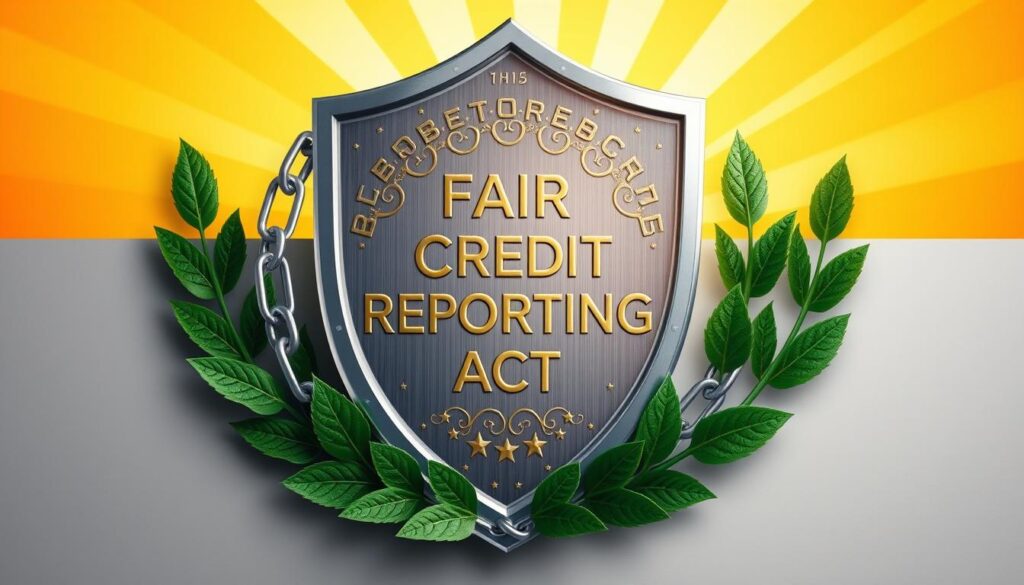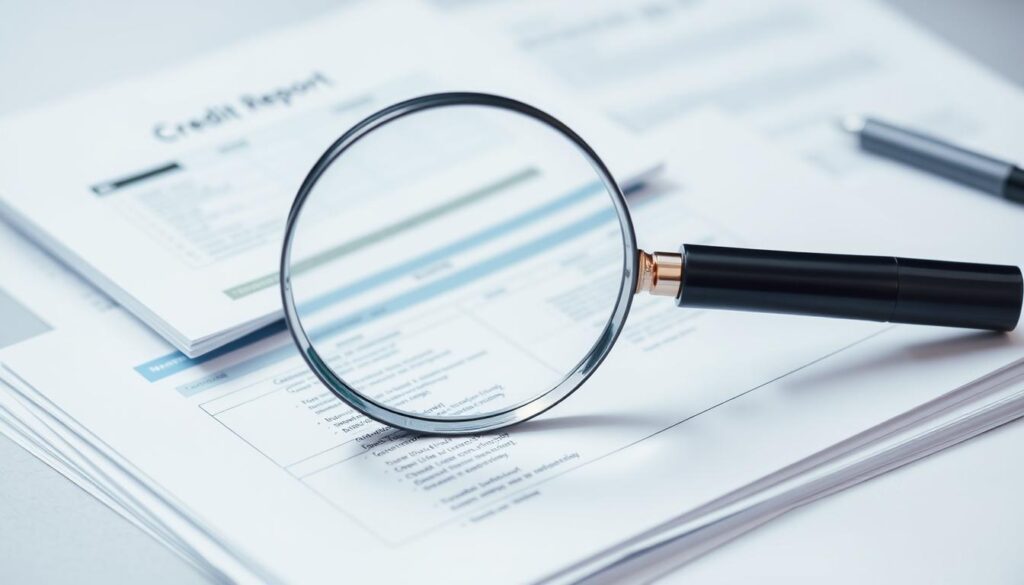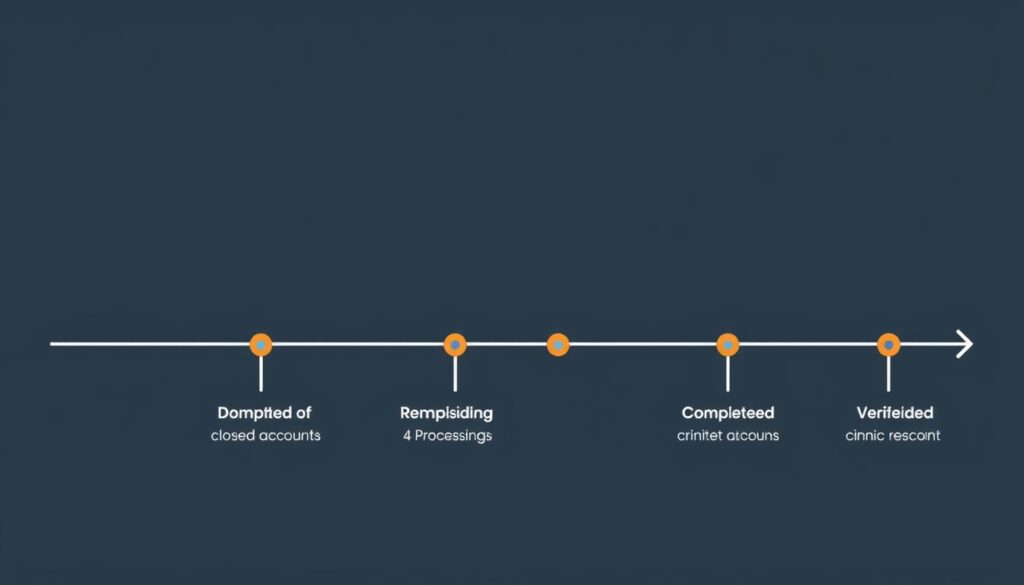Keeping your credit report accurate is vital for a healthy credit score. Closed accounts can affect your credit profile. This guide helps you remove closed accounts and take control of your credit repair.
Understanding credit report disputes is crucial for improving your credit score. We’ll cover steps for writing a strong dispute letter. You’ll also get a template for effective communication with credit bureaus.
This guide equips you to handle closed accounts confidently. You’ll learn to clean up your credit history. We’ll show you how to ensure your report reflects your current financial status.
Key Takeaways
- Closed accounts can impact your credit score
- Credit bureaus must investigate disputes within 30 days
- A well-crafted dispute letter is essential for removal requests
- You can submit disputes online, by mail, or by phone
- Supporting documentation strengthens your case for removal
Understanding Closed Accounts on Your Credit Report
Closed accounts shape your credit history. They can be positive or negative. These accounts influence your credit score and financial health.
Impact on Credit Scores
Closed accounts affect your credit score in two ways. They influence your credit history length and utilization ratio. A long-standing account can boost your score, even if closed.
Closing an account might increase your credit utilization. This could potentially lower your score. It’s important to consider these factors when managing accounts.
| Factor | Positive Impact | Negative Impact |
|---|---|---|
| Credit History Length | Older closed accounts maintain credit age | Closing oldest account reduces average age |
| Credit Utilization | Closed account with zero balance | Higher ratio due to reduced available credit |
| Payment History | Positive payment record remains visible | Negative information stays for extended period |
Duration on Credit Reports
Closed accounts stay on your credit report for different periods. Accounts with positive payment history can remain for up to 10 years. They continue to contribute to your credit score.
Negative accounts, including those with late payments, typically last for 7 years. These can have a lasting impact on your credit report.
Reasons for Removal
You might want to remove closed accounts with inaccurate information. These inaccuracies can unfairly lower your score. Removing accounts can sometimes improve your credit utilization ratio.
- Incorrect account information
- Outdated negative marks
- Improvement of credit utilization ratio
- Simplification of credit report
The Importance of Credit Report Accuracy
Your credit report affects your financial life significantly. It can impact loan approvals, apartment rentals, and job opportunities. Accurate data is crucial for fair credit reporting and lending decisions.

Think of your credit report as a financial report card. It shows your credit history and helps lenders assess your creditworthiness. Incorrect information can lead to unfair decisions and cost you money.
Higher interest rates or denied opportunities may result from inaccuracies. This can potentially add up to thousands of dollars in extra costs.
“An accurate credit report is the foundation of fair lending practices and informed financial decisions.”
Knowing credit score factors is essential. Payment history, credit use, and credit history length all affect your score. The types of credit accounts and recent inquiries also play a role.
Errors in any of these areas can greatly impact your creditworthiness. It’s important to check for mistakes regularly.
| Credit Score Factor | Impact on Score | Importance of Accuracy |
|---|---|---|
| Payment History | 35% | Crucial for fair lending decisions |
| Credit Utilization | 30% | Affects perceived financial responsibility |
| Length of Credit History | 15% | Demonstrates long-term credit management |
| Credit Mix | 10% | Shows ability to handle various credit types |
| New Credit Inquiries | 10% | Indicates recent credit-seeking behavior |
Review your credit report often to ensure accuracy. This helps you make smart financial choices. By staying alert, you protect your financial future.
Your vigilance also maintains fair credit reporting for all consumers. Regular checks benefit both you and the broader financial community.
When to Consider Removing Closed Accounts
Your credit score depends on your credit mix and account status. Knowing when to remove closed accounts is vital for a healthy credit score. Let’s explore key factors for deciding whether to keep or remove closed accounts.
Positive vs. Negative Account History
Closed accounts impact your credit score based on their history. Positive accounts can boost your credit age and show responsible financial behavior. Keep closed accounts with good payment history to maintain a strong credit mix.
| Account Type | Impact on Credit Score | Recommendation |
|---|---|---|
| Positive History | Beneficial | Keep on report |
| Negative History | Detrimental | Consider removal |
Timeframe Considerations
The age of your credit accounts greatly affects your credit score. Older accounts typically have a positive impact on your credit history. You might consider removing newer closed accounts that don’t contribute much to your credit age.
Impact on Credit Utilization Ratio
Your credit utilization ratio is crucial for your credit score. Closed credit card accounts can reduce your available credit, affecting this ratio. Consider keeping closed accounts if removing them would significantly increase your utilization ratio.
Evaluate how each closed account affects your overall credit profile before making any decisions. This will help you maintain a strong credit score and financial standing.
Legal Rights Under the Fair Credit Reporting Act
The Fair Credit Reporting Act (FCRA) gives consumers important rights for credit report accuracy. It protects against errors and sets rules for credit reporting agencies. This law helps ensure your credit information is correct.

The FCRA lets you dispute wrong info on your credit reports. Credit agencies must look into these disputes within 30 days. They have to fix or remove any mistakes they find quickly.
The dispute process is a key part of the FCRA. Here’s how it usually works:
- You identify an error on your credit report
- You file a dispute with the credit reporting agency
- The agency investigates your claim
- They correct or remove inaccurate information
The FCRA also gives you free access to your credit reports. You can get one free copy each year from Equifax, Experian, and TransUnion.
| Credit Reporting Agency | Free Report Frequency | Dispute Method |
|---|---|---|
| Equifax | Annual | Online, Mail, Phone |
| Experian | Annual | Online, Mail, Phone |
| TransUnion | Annual | Online, Mail, Phone |
Knowing these rights helps you manage your credit report’s accuracy. You can take charge of your credit profile and keep it healthy.
Sample Letter to Remove Closed Accounts
Crafting a credit dispute letter can seem challenging. But don’t worry! We’ll guide you through creating an effective account removal request. Let’s look at key elements and a template to help you start.
Key Components of an Effective Removal Letter
A strong credit dispute letter needs several important parts. Include your personal details, account information, and reason for the dispute. Write clearly and briefly.
Don’t forget to add supporting documents. These will help back up your claim.
Customizable Template for Your Use
Here’s a template for your account removal request:
| Section | Content |
|---|---|
| Your Information | Full name, address, phone number |
| Credit Bureau Info | Name and address of the credit bureau |
| Account Details | Account number, creditor name |
| Dispute Reason | Clear explanation of why the account should be removed |
| Request | Ask for account removal and updated credit report |
Tips for Personalizing Your Letter
Make your credit dispute letter stand out by being specific. Explain any unusual circumstances briefly. If needed, express regret for late payments.
Your main goal is simple. Present a strong case for correcting your credit report.
Steps to Prepare Your Removal Request
Preparing to remove closed accounts from your credit report requires careful planning. Begin by thoroughly reviewing your credit report. This helps identify errors or outdated information affecting your credit score.

Next, gather all necessary documentation. This includes account statements, creditor correspondence, and proof of account closure. Don’t forget to collect any relevant payment records.
These documents support your case for removing closed accounts. Keep them organized for quick reference during the dispute preparation.
- Account statements
- Correspondence with creditors
- Proof of account closure
- Any payment records
Lastly, craft your dispute letter. Clearly state your request and include all necessary personal information. Specify which accounts you want removed and why.
A well-prepared letter boosts your chances of success. It helps in getting closed accounts off your credit report.
“A successful removal request starts with thorough preparation and clear communication.”
These steps equip you to tackle the removal process effectively. Review your credit report, gather documents, and prepare your dispute.
Remember, patience and attention to detail are crucial. They’ll help improve your credit profile throughout this process.
Submitting Your Request to Credit Bureaus
Ready to remove closed accounts from your credit report? You’ll need to contact the major credit bureaus. This means reaching out to Equifax, Experian, and TransUnion directly.
Contact Information for Credit Bureaus
Each credit bureau has unique contact details for submitting disputes:
| Credit Bureau | Mailing Address | Online Dispute |
|---|---|---|
| Equifax | P.O. Box 740256, Atlanta, GA 30374-0256 | www.equifax.com/disputes |
| Experian | P.O. Box 9701, Allen, TX 75013 | www.experian.com/disputes |
| TransUnion | P.O. Box 2000, Chester, PA 19016 | www.transunion.com/disputes |
Submission Methods
You can submit your request online or by mail. Online submissions are quicker but may have fewer options. Mailed requests allow for detailed explanations and supporting documents.
Required Documentation
Include these items with your dispute letter:
- Copy of government-issued ID
- Proof of address
- Relevant account statements
- Any correspondence with creditors
The credit dispute process takes time. Stay patient and follow up if needed. This helps ensure your closed accounts are handled correctly.
Following Up on Your Removal Request
After submitting your request to remove closed accounts, stay vigilant. Credit bureaus have 30 days to investigate your claim. They must provide credit report updates within this timeframe.

If you don’t hear back in 30 days, take action. Contact the credit bureaus to check on your request status. Use this timeline as a guide:
| Timeline | Action |
|---|---|
| Day 1-30 | Wait for credit bureau response |
| Day 31-35 | Follow up if no response received |
| Day 36-45 | Review updated credit reports |
| Day 46+ | Consider additional steps if needed |
After receiving the results, review your updated credit reports carefully. Check that the closed accounts are no longer listed. Verify that all requested changes have been made.
If you’re unhappy with the dispute resolution, you have options. File a complaint with the Consumer Financial Protection Bureau. They can help mediate and ensure fair treatment.
Stay persistent to maintain accurate credit reports. Regular follow-ups are key to your financial health. Keep reviewing your credit information thoroughly.
Alternative Methods to Improve Your Credit Score
Raising your credit score requires time and effort. However, there are several effective strategies you can use. Let’s explore some alternative methods to boost your creditworthiness.
Focus on your payment history first. Pay your bills on time consistently. Set up automatic payments or reminders to avoid late fees and negative marks.
Next, address your credit utilization. Keep credit card balances below 30% of your limits. Paying down existing debts can greatly impact your score.
Diversifying your credit mix can also help. A healthy blend of credit types shows lenders you can manage various financial responsibilities.
Be careful with new credit applications. Each hard inquiry can temporarily lower your score. Avoid opening multiple accounts in a short time.
- Consider becoming an authorized user on a family member’s credit card with a strong payment history
- Review your credit reports regularly for errors and dispute any inaccuracies promptly
- Keep old credit accounts open to maintain a longer credit history
Improving your credit score takes time. Stay patient and consistent in your efforts. You’ll see positive results over time.
Conclusion
Managing your credit report is crucial for financial health. Understanding closed accounts’ impact on your credit score helps you make smart decisions. Removing these accounts can boost your score when done correctly.
The Fair Credit Reporting Act gives you important rights. Use them to manage your credit report effectively. Stay proactive in your approach to credit management.
Monitoring your credit report is an ongoing task. It’s key to maintaining good financial health. Dispute errors and make wise financial choices regularly.
By staying vigilant with your credit, you’re setting up for success. An improved credit score can lead to better financial opportunities later on.
FAQ
How can I dispute inaccurate information on my credit report?
How do closed accounts impact my credit score?
Why is it important to have accurate credit reports?
When should I consider removing closed accounts from my credit report?
What legal rights do I have regarding credit report accuracy?
What should an effective letter to remove closed accounts include?
How do I prepare a request to remove closed accounts from my credit report?
How do I submit my request to remove closed accounts to credit bureaus?
What should I do if my request to remove closed accounts is not resolved satisfactorily?
What are some alternative methods to improve my credit score?
Source Links
- SAMPLE LETTER: Credit report dispute – https://files.consumerfinance.gov/f/documents/092016_cfpb__CreditReportingSampleLetter.pdf
- The Most Effective Credit Bureau Dispute letter ( 2024 Template) – https://www.imaxcredit.com/credit-dispute-letters-credit-bureau/
- How to Write a Goodwill Deletion Letter (Plus Template) – https://www.thepennyhoarder.com/debt/goodwill-letter/

